

CRIIGEN - Accueil. Home - GMO Seralini. Gilles-Éric Séralini. Food and Chemical Toxicology - Long term toxicity of a Roundup herbicide and a Roundup-tolerant genetically modified maize. This article has been retracted: please see Elsevier Policy on Article Withdrawal ( The journal Food and Chemical Toxicology retracts the article “Long term toxicity of a Roundup herbicide and a Roundup-tolerant genetically modified maize,” which was published in this journal in November 2012.
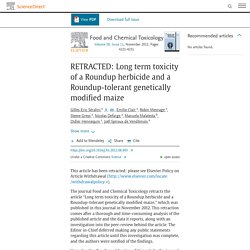
This retraction comes after a thorough and time-consuming analysis of the published article and the data it reports, along with an investigation into the peer-review behind the article. The Editor in-Chief deferred making any public statements regarding this article until this investigation was complete, and the authors were notified of the findings. Very shortly after the publication of this article, the journal received Letters to the Editor expressing concerns about the validity of the findings it described, the proper use of animals, and even allegations of fraud. (pdf) Final-Paper seralini illicit retraction. Long term toxicity of a Roundup herbicide and a Roundup-tolerant genetically modified maize.
How independent is the Science Media Centre and its experts? This is the first part of a response by GMWatch to the Science Media Centre's "expert reaction" to Seralini's study on GM maize.
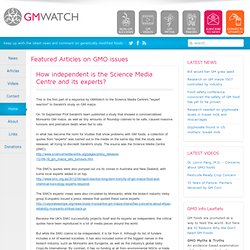
On 19 September Prof Seralini's team published a study that showed a commercialised Monsanto GM maize, as well as tiny amounts of Roundup claimed to be safe, caused massive tumours and premature death when fed to rats. In what has become the norm for studies that show problems with GM foods, a collection of quotes from "experts" was rushed out to the media on the same day that the study was released, all trying to discredit Seralini's study. The source was the Science Media Centre (SMC). The SMC's quotes were also pumped out via its clones in Australia and New Zealand, with some local experts added in on top. The SMC's experts' views were also circulated by Monsanto, while the biotech industry lobby group Europabio issued a press release that quoted these same experts.
But while the SMC claims to be independent, it is far from it. OGM-Monsanto: Pourquoi le gouvernement français s’est affolé. C’est une histoire aux confins du scientifique, du politique et du médiatique.
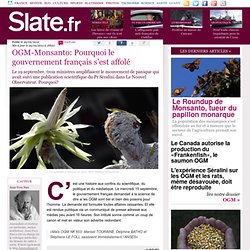
Le mercredi 19 septembre, le gouvernement français demandait à la science de dire si les OGM sont bel et bien des poisons pour l’homme. La demande est formulée toutes affaires cessantes. Et elle est rendue publique via un communiqué de presse adressé aux médias peu avant 16 heures. Research intelligence - Shock troops check 'poor' GM study. Science Media Centre's rapid rollout of experts' views sway most media.
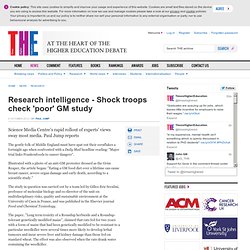
Paul Jump reports The gentle folk of Middle England must have spat out their cornflakes a fortnight ago when confronted with a Daily Mail headline reading: "Major trial links Frankenfoods to cancer dangers". Illustrated with a photo of an anti-GM protester dressed as the Grim Reaper, the article began: "Eating a GM food diet over a lifetime can cause breast cancer, severe organ damage and early death, according to a scientific study. " The study in question was carried out by a team led by Gilles-Eric Seralini, professor of molecular biology and co-director of the unit on multidisciplinary risks, quality and sustainable environment at the University of Caen in France, and was published in the Elsevier journal Food and Chemical Toxicology.
According to the Mail, "scientists" believed the results "raised serious questions about the safety of GM foods". Science: European Food Safety Authority Finds Controversial GM Study Wanting. The European Food Safety Authority (EFSA) says a recent study on the toxicity of genetically modified maize and a common herbicide is inconclusive.
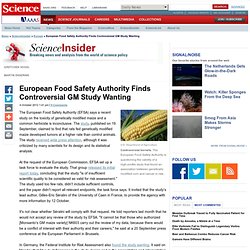
The study, published on 19 September, claimed to find that rats fed genetically modified maize developed tumors at a higher rate than control animals. The study received wide press attention, although it was criticized by many scientists for its design and its statistical analysis. At the request of the European Commission, EFSA set up a task force to evaluate the study. That group released its initial report today, concluding that the study "is of insufficient scientific quality to be considered as valid for risk assessment.
" The study used too few rats, didn't include sufficient controls, and the paper didn't report all relevant endpoints, the task force says. Seralini's response. 1.
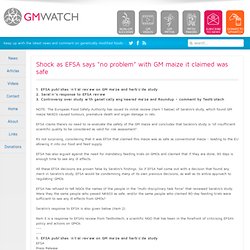
EFSA publishes initial review on GM maize and herbicide study2. Seralini's response to EFSA review3. Controversy over study with genetically engineered maize and Roundup - comment by Testbiotech. PR attacks or considered objective analysis? 1.Yes, scientists are attacking the latest Monsanto corn study but not because of the science2.Monsanto fail they can't sweep the latest shocking GMO study under the rug–-–-1.Yes, scientists are attacking the latest Monsanto [corn] study but not because of the scienceJeremy BloomRed Green & Blue, September 30 2012 [shortened] You've probably heard by now that some scientists are attacking the latest Monsanto study, which shows their genetically modified (GMO) corn causes ugly tumors in rats.
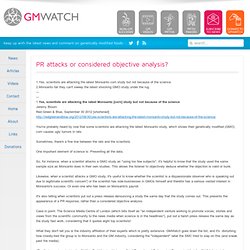
Sometimes, there's a fine line between the rats and the scientists. One important element of science is: Presenting all the data. So, for instance, when a scientist attacks a GMO study as "using too few subjects", it's helpful to know that the study used the same sample size as Monsanto does in their own studies. This allows the listener to objectively deduce whether the objection is valid or bunk. EFSA Press Release: EFSA publishes initial review on GM maize and herbicide study. Press Release 4 October 2012 The European Food Safety Authority has concluded that a recent paper raising concerns about the potential toxicity of genetically modified (GM) maize NK603 and of a herbicide containing glyphosate is of insufficient scientific quality to be considered as valid for risk assessment.

EFSA’s initial review found that the design, reporting and analysis of the study, as outlined in the paper, are inadequate. To enable the fullest understanding of the study the Authority has invited authors Séralini et al to share key additional information. Étude choc sur les OGM : coup de pub ou scandale sanitaire ? Disputed Study Links Modified Corn to Greater Health Risks. OGM et herbicides : l'étude de Séralini est un bon début. L'étude de Gilles-Éric Séralini montre le danger des OGM (Closon Denis/SIPA) SCIENCES.
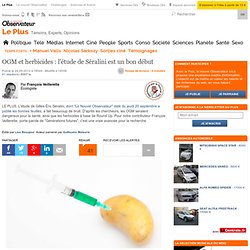
L’étude de Gilles Eric Séralini parue dans "Food and Chemical Toxicology" le 19 septembre dernier a déclenché un véritable raz de marée médiatique. Quoi de plus normal : cette étude est en effet la première à étudier, sur des animaux de laboratoire, les effets chroniques à long terme (24 mois) d’un régime OGM. Au-delà des résultats inquiétants de cette étude, l’évènement reste… qu’il aura fallu que des chercheurs publics reconnus trouvent des fonds privés pour qu’enfin une telle étude sur 2 ans soit faite.
Cet événement a donc pointé les lacunes du système d’évaluation européen, l’EFSA (l’autorité sanitaire des aliments européenne), qui a toujours refusé de conduire une telle étude. Gilles-Eric Séralini - OGM: Tous Cobayes - C'est pas du vent / RFI. GMO=POISON FOODS= MONSANTO="MONSAN-NOCCHIO"= LIEING ALL THE TIME TO YOU! TOUS COBAYES english undertitles. Revealed: Monsanto GM corn caused tumors in rats. Monsanto weedkiller and GM maize in 'shocking' cancer study. The world’s best-selling weedkiller, and a genetically modified maize resistant to it, can cause tumours, multiple organ damage and lead to premature death, new research published today reveals.

In the first ever study to examine the long-term effects of Monsanto’s Roundup weedkiller, or the NK603 Roundup-resistant GM maize also developed by Monsanto, scientists found that rats exposed to even the smallest amounts, developed mammary tumours and severe liver and kidney damage as early as four months in males, and seven months for females, compared with 23 and 14 months respectively for a control group.
Study linking GM crops and cancer questioned - health - 19 September 2012. Read full article Continue reading page |1|2 Update: Six French scientific academies issued a statement on 19 October, saying the Séralini study could not reverse previous conclusions that this and other GM crops are safe, because of problems with the experimental design, statistical analysis and animals used, and inadequate data. Meanwhile the European Food Safety Authority declared the study "of insufficient scientific quality to be considered as valid for risk assessment".
As promised, the organisation invited Séralini "to share key additional information". That invitation was made on 4 October, and repeated on 19 October. Original article, posted 19 September 2012. Conflict of interest. The presence of a conflict of interest is independent of the occurrence of impropriety. Therefore, a conflict of interest can be discovered and voluntarily defused before any corruption occurs. A widely used definition is: "A conflict of interest is a set of circumstances that creates a risk that professional judgement or actions regarding a primary interest will be unduly influenced by a secondary interest. "[1] Primary interest refers to the principal goals of the profession or activity, such as the protection of clients, the health of patients, the integrity of research, and the duties of public office. Secondary interest includes not only financial gain but also such motives as the desire for professional advancement and the wish to do favours for family and friends, but conflict of interest rules usually focus on financial relationships because they are relatively more objective, fungible, and quantifiable.
Related to the practice of law[edit] Organizational[edit] Types[edit] Richard E. Goodman - Monsanto (revolving door)
Food Science and Technology Department - Richard Goodman. (pdf)#Séralini Poor scientific value, serious professional fault, simply unethical… French academies aren't pulling punches. Anthony Trewavas. Anthony J. Trewavas is a professor at the University of Edinburgh[1] , best known for his research in the fields of plant physiology and molecular biology. His recent research used a flexible confocal fluorescence ratio aiming assembly to image calcium redistribution during contact sensing, stomatal aperture control, pollen tube and rhizoid growth, moss development and photomorphogenesis.
Plants were transformed with the gene for the calcium sensitive luminescent protein aequorin, allowing measurements of cytosolic calcium in plants and bacteria. Plants have also been transformed with genes for calmodulin to better assess the role of calcium in development. The group also cloned plant calcium channels and MARCKS, an actin/calmodulin binding protein. Anthony Trewavas - Projects - Edinburgh Research Explorer. GMO, Global Alert. OGM, une étude préoccupante - OGM.
Le titre de l’hebdomadaire Le Nouvel Observateur à paraître jeudi 20 septembre est particulièrement affirmatif : « Oui, les OGM sont des poisons ! » Et la suite de l’article prend des allures d’enquête policière alarmante : « Des chercheurs français ont étudié secrètement, pendant deux ans, 200 rats nourris au maïs transgénique. Tumeurs, pathologies lourdes… une hécatombe. Et une bombe pour l’industrie OGM. » L’étude est à paraître dans la revue internationale de toxicologie alimentaire Food and Chemical Toxicology.
Et pour Gilles-Eric Seralini, chercheur à l’Université de Caen, qui a dirigé l’équipe à l’origine de cette étude : « Les résultats sont alarmants. » Lors du test, deux cents rats ont été nourris pendant deux ans avec un maïs OGM NK603 ( Un OGM est un Organisme génétiquement modifié), traité dans certains cas avec l’herbicide Roundup. Des OGM déjà testés à trois ans, mais jamais avec des analyses aussi approfondies C’est la première fois, selon M. Scientists Smell A Rat In Fraudulent Genetic Engineering Study. GMO safe? Opponents are skewing the science to scare people. Photo by Scott Olson/Getty Images.
I used to think that nothing rivaled the misinformation spewed by climate change skeptics and spinmeisters. Then I started paying attention to how anti-GMO campaigners have distorted the science on genetically modified foods. You might be surprised at how successful they've been and who has helped them pull it off. I’ve found that fears are stoked by prominent environmental groups, supposed food-safety watchdogs, and influential food columnists; that dodgy science is laundered by well-respected scholars and propaganda is treated credulously by legendary journalists; and that progressive media outlets, which often decry the scurrilous rhetoric that warps the climate debate, serve up a comparable agitprop when it comes to GMOs.
In short, I’ve learned that the emotionally charged, politicized discourse on GMOs is mired in the kind of fever swamps that have polluted climate science beyond recognition. Elements of Precaution: Recommendations for the Regulation of Food Biotechnology in Canada. Rat reality show: Russian scientists to broadcast GMO experiment. After a French study suggested that rats fed on Monsanto GMO corn suffered tumors, Russian researches plan their own, this time public, experiment.
The unique reality show with rats is expected to prove or deny GMO’s health-threatening influence. The Russian scientists, who oppose genetically modified organisms (GMO) in food, expect that their year-long experiment will show whether the controversial cultivation process has effects as dangerous as French revelations claimed on September 19. Scientists from France's University of Caen made public the results of their classified study, publishing the images of rats with tumors after they were fed a diet of genetically modified (GM) maize produced by American chemical giant Monsanto. The revelation stirred fear across Europe and in Russia, where authorities temporarily suspended the import and sale of Monsanto’s genetically modified corn. Scientist who linked GMOs and glyphosate to rat tumors wins SECOND court case against criminal biotech shills who forged signatures to discredit his research. Scientist who linked GMOs and glyphosate to rat tumors wins SECOND court case against criminal biotech shills who forged signatures to discredit his research.
The Parisian High Court has ruled that French Professor Gilles-Eric Seralini, a scientist known for his controversial research linking GM feed with cancerous tumor growth in rats, was right when he concluded that GMOs are unsafe for human consumption. Marc Fellous, former chairman of France's Biomolecular Engineering Commission (BEC), has been indicted for "forgery" and "the use of forgery," in a libel trial that he lost to Prof Gilles-Eric Seralini. Séralini.